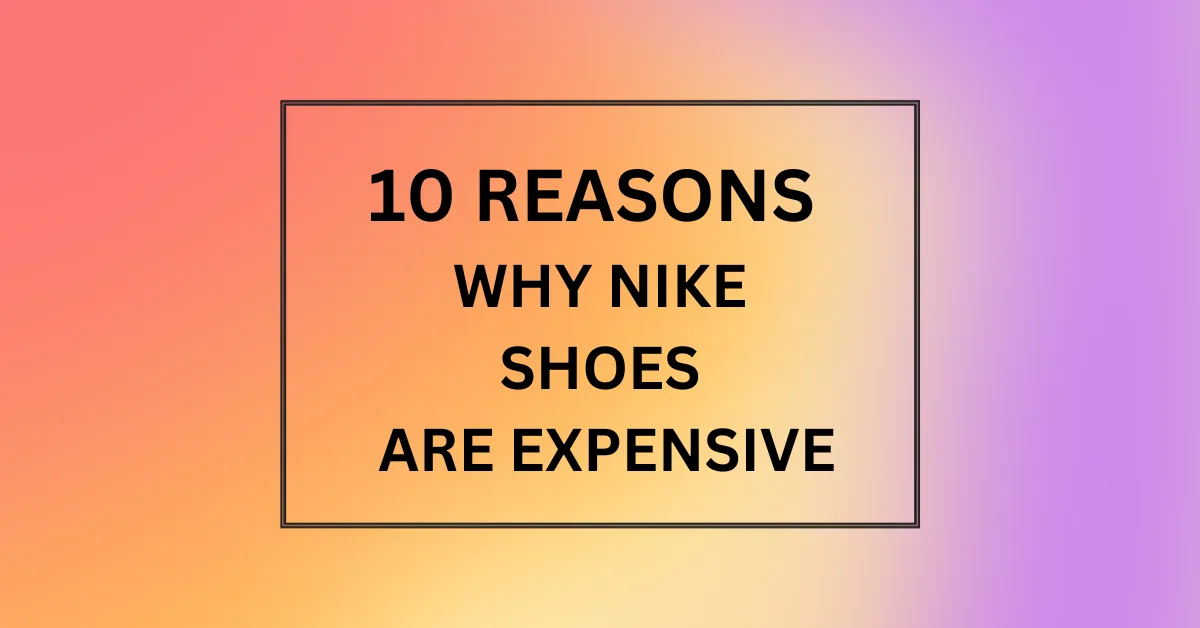Nike shoes are expensive because of the high costs associated with athlete endorsements, research and development, premium branding and materials, limited edition models, hand craftsmanship, distribution through upscale retailers, smaller batch production, and the pricing power that comes with being an established, market-leading brand.
Nike shoes have a reputation for being some of the most expensive athletic shoes on the market. From their Air Jordans to Lebrons, Nike is known for putting out high-end sneakers that come with equally high price tags. But why exactly are Nikes so expensive compared to other athletic shoe brands? Here are the top 10 reasons behind the hefty Nike price tag.
Top 10 Reasons Why Are Nike Shoes So Expensive
1. Nike spends big on athlete endorsements
One of the main reasons Nike shoes are pricier is that Nike spares no expense when it comes to signing endorsement deals with top athletes and sponsoring major sports teams.
They shell out millions to score licensing deals with sports stars like Michael Jordan, LeBron James, and Cristiano Ronaldo to help market their products. These big sponsorship costs ultimately get passed down to the consumer through higher retail prices.
2. Nike invests heavily in research and development
Nike pours tons of money into their research and design laboratories to continuously develop new technologies and innovative features for their shoes. Things like their Flyknit upper construction and Air cushioning systems require extensive R&D.
While this leads to advanced performance shoes, all that research and testing comes at a high cost.
3. Nike shoes are marketed as premium products
Nike has successfully branded itself as a premium athletic brand that emphasizes high performance and quality products. Everything from celebrity endorsements to slick marketing campaigns is engineered to present Nike shoes as top of the line.
This cultivated prestige allows Nike to command more for their products compared to less hyped brands.
4. Many Nike shoes are made with high-end materials
From real leather uppers to Zoom Air units and Lunarlon foam, Nike incorporates a lot of high-quality materials into their footwear.
While these materials improve comfort and performance, sourcing them is more labor intensive and drives manufacturing costs up. So the use of premium components makes the retail prices go up as well.
5. Limited edition & collab shoes drive up resale value
Whenever Nike drops a hot new limited edition or collaboration sneaker, resellers buy up stock and sell the kicks at inflated prices.
The high resale market value on certain coveted Nike models like Off-White Jordans or Travis Scott Dunks allows retailers to also raise retail prices while still selling out stock. This aftermarket hype lets Nike push the limits on pricing.
6. Nike shoes are hand assembled for quality
Despite being a huge corporation, Nike still utilizes an extensive amount of hand craftsmanship. Rather than just being mass produced entirely by machines, Nike shoes see a lot of hands-on assembly to ensure proper quality. While this results in well-crafted kicks, having humans involved in manufacturing increases labor costs compared to full automation.
7. Nike sells premium shoes through higher-end retailers
You’ll notice Nike’s most expensive and sought after shoes are not found in big box stores like Walmart. Instead, they are primarily sold through upscale footwear chains, boutiques, and brand-owned Nike stores.
These premium retailers have higher operational costs and also take a larger cut compared to mass discount outlets. So shopping at higher-end stores leads to inflated Nike prices.
8. Nike shoes are made in smaller batches
Rather than mass produce endless quantities of every shoe model, Nike makes many designs in smaller production runs. This artificial supply constraint can enable price hikes by driving demand above availability.
Limited batch production also results in higher per unit costs compared to mass manufacturing huge volumes.
9. There are import costs associated with overseas manufacturing
While Nike has some domestic US manufacturing, much of their footwear is produced abroad in countries like China, Vietnam, and Indonesia to save on labor costs.
Importing shoes from Asia incurs additional supply chain expenses including overseas shipping fees, tariffs, and taxes. These costs contribute to shoes being more expensive by the time they hit retail.
10. Nike has pricing power as an established brand
As the dominant market leader in athletic footwear, Nike has tremendous pricing power. Consumers expect Nike shoes to be expensive and are willing to pay a premium for the swoosh logo.
Allowing Nike to charge high prices since they have earned brand recognition and consumer trust over decades of quality products.
Is Nike a good shoe brand?
Yes, Nike is considered one of the best athletic shoe brands due to their innovative technology, celebrity athlete endorsements, stylish designs, premium materials, and strong focus on high performance and quality.
Are Nike shoes good?
Nike shoes are known for being very high quality in terms of comfort, durability, traction and support thanks to cutting-edge features like Air cushioning and Flyknit uppers. Their performance shoes are worn by many top athletes.
Are Nike shoes worth the price?
For serious athletes and sneakerheads, the hefty Nike price tags are justified by their technologies that enhance performance as well as their iconic stylish designs and premium brand image. But more casual wearers may not need their advanced features.
Where to buy Nike shoes?
Nike shoes can be purchased directly through Nike’s Website or brand name stores located in malls and outlet centers. They are also carried by upscale footwear chains like Foot Locker as well as large retailers like Dick’s Sporting Goods.

